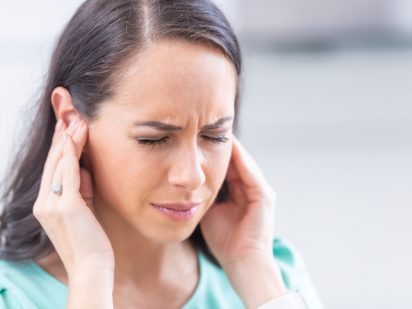Over 50 million Americans, or about 15 percent, experience some form of tinnitus, which has become a common health condition in the country.
Mayo Clinic defines tinnitus as the sensation of hearing sound when no external sound is present. Symptoms can present in different forms, including ringing, buzzing, roaring, clicking, hissing, or humming. According to the American Tinnitus Association, roughly 20 million people struggle with burdensome chronic tinnitus, while 2 million have extreme and debilitating cases.
Tinnitus can come from a variety of reasons, including exposure to high noise levels, hearing loss, or exposure to toxic medications, explained Jerrica Maxson, AuD, CCC-A, an audiologist with Trinity Health. “It becomes more noticeable with stress, caffeine intake, aspirin intake, and some prescription medications have tinnitus listed as a side effect.”
Recent research across the world is exploring the impact of the COVID-19 pandemic on tinnitus, Maxson said. “Some studies are demonstrating COVID-19 initiation of tinnitus and COVID-19 symptoms exacerbating tinnitus,” she noted. “The social and emotional consequences of the pandemic have made pre-existing tinnitus more bothersome for some of the population. Factors like loneliness, poor sleep, financial worries, and lack of exercise have been noted to impact pre-existing tinnitus.”
If someone has newly developed tinnitus, or if their existing tinnitus has now changed and is causing concern, “they should let their physician know and seek a hearing evaluation,” Maxson said. “An evaluation should not be delayed if the tinnitus pulses.”
Maxson said that with a hearing evaluation, audiologists can rule out hearing loss and can make any necessary referrals “if there are concerns with the hearing evaluation.”
A hearing evaluation includes various hearing tests, including tympanometry to assess the outer ear or middle ear and otoacoustic emission screening to measure outer hair cell activity.
Options for intervention vary depending on how each patient experiences tinnitus, as well as accompanying symptoms, such as hearing loss.
While tinnitus cannot be treated, there are tools that can help to manage it, Maxson said. “For some people, managing caffeine can be very helpful. Whether hearing loss exists or not, hearing aids with tinnitus masking technology have been very effective at minimizing the impact of tinnitus. Most of our hearing aid users who report tinnitus before getting hearing aids either no longer notice it or have a significant reduction in the handicap it is causing, with regular hearing aid use.”
Additionally, masking noises to distract from the tinnitus can help. “Most people notice their tinnitus when it’s quiet,” Maxson said, noting that this sensation is felt when a person goes to bed, reads, or works at the computer. “It can be really helpful to add a low level, quiet noise in the background to help distract from the tinnitus.”
Trinity Health Audiology, which includes Kelsey Artz, AuD; Jerrica Maxson, AuD, CCC-A; and Tricia Nechodom, AuD, PASC, is located at Health Center – West, 101 3rd Ave SW, Ste 203, Minot. For more information or to schedule an appointment, please call 701-857-5986.

